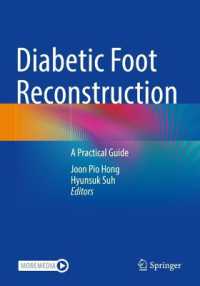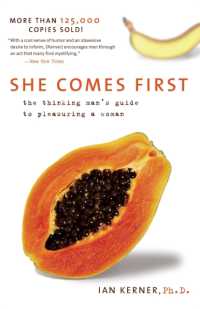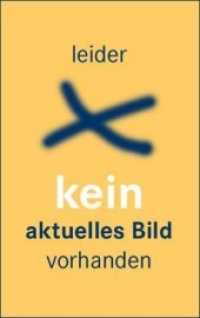- ホーム
- > 洋書
- > 英文書
- > Philosophy
Full Description
Consisting of contributions from a host of international scholars (in fields as diverse as literature, architecture, philosophy, and education), Alain Beauclair and Josh Toth's Nature and Its Unnatural Relations: Points of Access intercedes in ongoing debates about accessing, defining, and respecting a world humans continue to misuse and misunderstand—and that, as a result, is becoming increasingly inhospitable. The chapters shuttle between a variety of aesthetic and philosophical concerns—from theology and Biblical interpretation to colonialism, hermeneutics, phenomenology, worlding, posthumanism, and speculative realism. These varied approaches are united by a single aporetic thread: efforts to surmount the problem of "human access" invariably risk repeating (ever more blindly) the violence and immorality of anthropocentrism. We seem trapped in the cul-de-sac of the Anthropocene. To discover potential new exits, the contributors consider whether it is possible or advisable to abandon so-called "correlationism"—of art, of literature, of technology. If it is, then how? If not, how might we more ethically reembrace our innately corruptive relations with a world of non-human others? How might we free "nature" (finally) from the demands of human action and human thought without mendaciously reinscribing humanity's distance from it or denying a proximity that is only traversable by artificial means?
Contents
Introduction: What we Know (to be Unrelatable)
by Alain Beauclair and Josh Toth
Prologue: How to Advocate—Radically, Kindly [A Transcript, A Conversation]
by Tracey Lindberg
Part I: Outside Structures
Chapter 1: Encountering the Mountain: A Sketch for a Hermeneutics of Nature
by Ruairidh J. Brown
Chapter 2: Kawabata's Sealed Play: Restoration and Reenchantment
by Eric Bronson
Chapter 3: A Principled Account of Artistic Sublimity in Kant's Critique of Judgment
by Joshua D.F. Hooke
Chapter 4: Architecture and the Ends of Man: Derrida, Latour, Eisenman
by Henrik Oxvig and Dag Petersson
Part II: Before Nature
Chapter 5: Nature and Dominion in Genesis
by Robert Burch
Chapter 6: Making the Hands Impure: On the Role of Orality in Becoming Responsible for the More-Than-Human World
by Kaleb Cohen
Chapter 7: The Narrator's "Dialectic of Enlightenment" in Howard O'Hagan's Tay John
by Sergiy Yakovenko
Chapter 8: Romanticism and the Anthropocene: Mirrors and Inversions in Coleridge, Shelley, Emerson, and Melville
by Samantha C. Harvey
Part III: Reading Otherwise
Chapter 9: Beyond Negative Ecology: Earth Art in a Time of Climate Crisis
by John Culbert
Chapter 10: Re-calibrating Responses: De-conditioning Our Relationship to the Natural World Through Literature
by Jennifer Carmichael
Chapter 11: I Don't Believe in the Sun: Symbolic Action and Mythic Explanation in Klara and the Sun
by Ammon Allred
Chapter 12: Badiou's Scientific Event and Ishiguro's Klara and the Sun
by Adriel M. Trott
Epilogue: Moral Grandstanding
by Claire Colebrook








